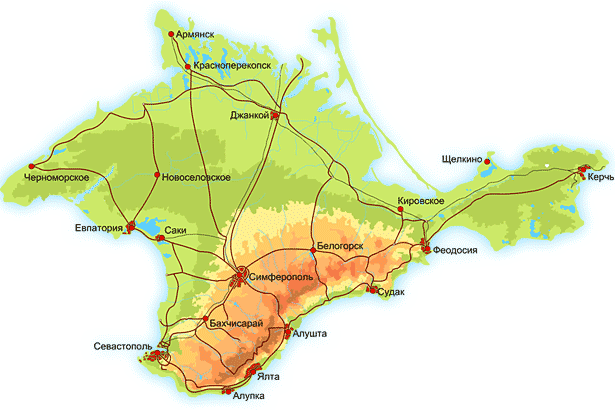The economic consequences of joining the Crimea to Russia

Historical justice has triumphed: the territory of Crimea, which belonged to Russia for 250 years, has returned to its native “walls”. But like any changes, transformations and development, the accession of the peninsula will be accompanied by the injection of a large amount of funds, which will affect the financing of other regions. How much money does Crimea need in order for it to become a fully developed subject of Russia?
Russia has just finished holding a large-scale sporting event - the Olympics - which, indeed, to be silent, has thinned the budget of Russia. Now, after the annexation of the peninsula into the Russian Federation, the Crimea should completely switch to providing Russia, which means electricity and water supply, wages and pensions, a transfer to compensate for the budget deficit of the new region, construction of a bridge across the Kerch Strait. All this from the budget of the country should be allocated $ 3 billion per year.
The authorities of the Crimea promise that in April the inhabitants of the peninsula will receive salaries, pensions and social benefits in rubles according to the new standards. For these purposes, Russia has sent 1 billion rubles to the Crimea. But, in order to pay money to more than half a million pensioners of the peninsula, Crimea needs more serious financial injections - for 5-6 billion rubles a month. It is also important to note here that pensions in Russia and Ukraine are assigned differently. This means that the transfer of a pension from hryvnia to a ruble will not be enough; recalculation must be carried out according to all the norms of the Russian Federation. But in such a short time, the Russian departments are unlikely to manage to debug the pension and salary systems, therefore, most likely, Crimeans will receive only allowances or indexation of pensions in Ukraine.
The change in pensions will not depend on the pensioner's work experience and his salary, but on the decisions of the government and the Russian budget. According to the analysis of specialists, the transition to a new pension system can be carried out in two to three months, provided that all forces will be thrown at it.
As the government of the Autonomous Republic is planning, the Ukrainian hryvnia will completely “leave” the peninsula by 1 in January of 2016. For these purposes, a state bank is already being created in the region, which can be considered a branch of the Russian Central Bank.
An important issue concerns the transformation of the infrastructure of Crimea. If you invest correctly in the peninsula, business developing throughout the republic will work not only for the benefit of the Black Sea fleet, but also help other regions of Russia. But in order to debug this mechanism, Crimean problems need to be addressed.
First of all, you need to re-register ownership of the land, because in Ukraine the procedure for transferring the territory into ownership differs from the Russian one. The Crimean land is very expensive, and the houses are generally equal on prices with apartments in Sochi. But nevertheless, more and more Russians want to buy an apartment on the peninsula. If you do not have the opportunity to buy an apartment in the Crimea, Selims will easily provide you list of apartments from the owner for long term or daily rent.
After the completion of all the paperwork, large companies will come to the peninsula, which will take a lot of time to debug the whole process of working in new conditions.
Is there a future for the economy of Crimea? There is no single expert opinion on this. The fact that the influx of tourists to the peninsula will be reduced - no one doubts, and tourism is a very large part of the region's income. But many experts believe that Crimea is an excellent platform for the implementation of economic tasks, which for some reason cannot be solved in Russia. Key areas in the economy of the peninsula are called tourism, ports and communications, agriculture, production development for domestic demand.
Information